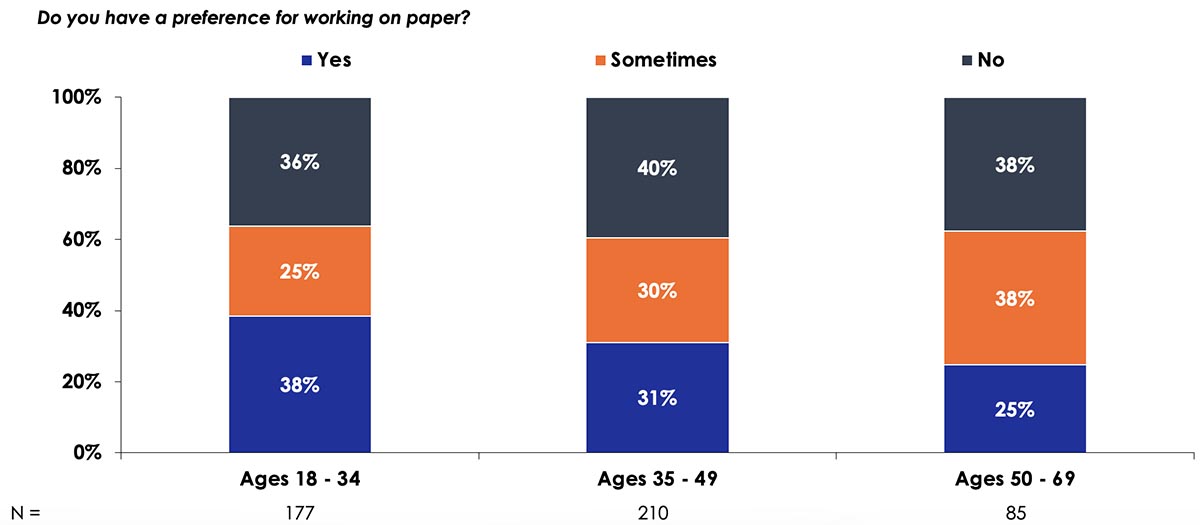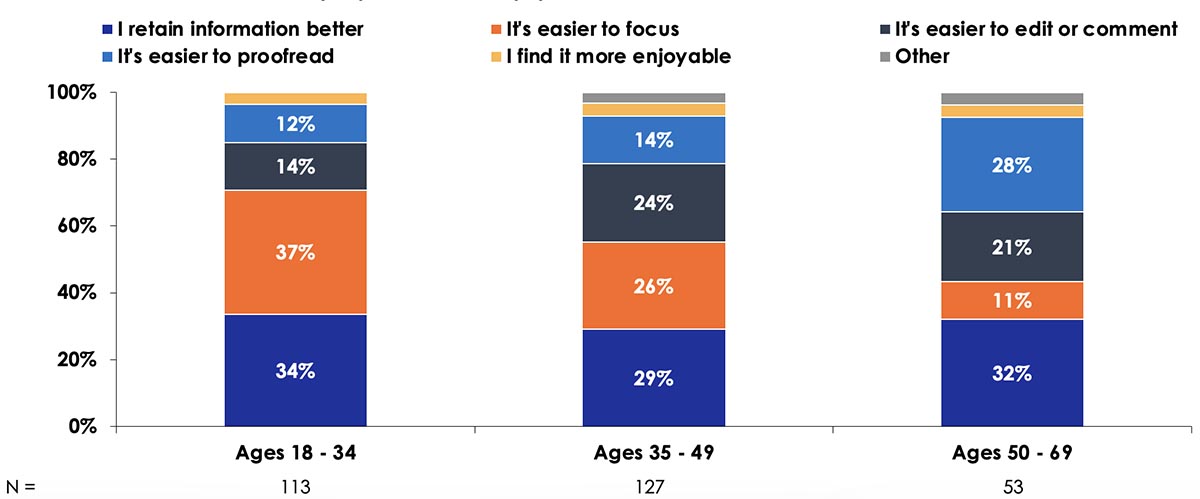- Younger consumers tend to see life as a consortium of both online and offline activities.
- A common misconception is that younger individuals regard print as old-fashioned and irrelevant, but Keypoint Intelligence’s research indicates that paper remains important among office workers under age 35.
- In total, 62% of surveyed office workers always or sometimes preferred working on paper. Employees under age 35 were even more likely to prefer working with paper than their older counterparts.
By Mark Davis
Introduction
There’s no question that the digital transformation is upon us, but paper remains essential for many office workers. In late 2022, Keypoint Intelligence surveyed nearly 500 general office workers in the United States to determine how they were working with print. All of these respondents were:
- Between the ages of 18 and 69
- Working with digital or paper documents
- Printing documents as part of their professional role
This article cites recent research from Keypoint Intelligence to highlight how today’s office workers are interacting with paper. It also explores paper’s particular appeal among younger office employees.
Who Are These People, Anyway?
Since “younger office workers” is a subjective term that can mean different things to different people, let’s start with a simple classification. Keypoint Intelligence’s most recent Future of Work survey divided office employees into the following bands:
- Ages 18–34
- Ages 35–49
- Ages 50–69
The 18–34 age band includes the adult members of Generation Z as well as younger Millennials. Generally speaking, individuals under the age of 35 tend to be very curious about the world around them. They want to stay informed and will often take the opportunity to increase their knowledge by traveling and/or learning new languages. Part of this curiosity stems from the type of media these younger consumers were exposed to growing up. They grew up with the Internet, social media, and online shopping. As a result, they see life as a consortium of both online and offline activities.
Many Younger Office Workers Prefer Paper
A common misconception among younger individuals is that they regard print as old-fashioned and irrelevant, but Keypoint Intelligence’s research indicates that paper remains important among office workers of all ages. In fact, office workers under the age of 35 were actually more likely to cite a preference for working on paper than the older two age bands.
Figure 1: Preference for Working on Paper

Base: General office workers
Source: United States Future of Work Survey; Keypoint Intelligence 2022
Those respondents who always or sometimes preferred working on paper were asked why this was the case. The most common reasons were that they could retain information better and they found it easier to focus. As shown in the chart below, younger consumers were especially likely to state that working on paper made it easier for them to focus.
Figure 2: Primary Reason for Preferring to Work on Paper

Base: General office workers who sometimes or always prefer paper
Source: United States Future of Work Survey; Keypoint Intelligence 2022
The Bottom Line
The future of office work is surely changing. According to this same Keypoint Intelligence study, 19% of total office workers were now fully remote, and another 41% were hybrid employees. Meanwhile, only 36% were currently in the office 100% of the time. People might be working differently than they used to, but their reliance on and preference for paper will likely remain. Digital distraction is real, so it is perhaps not surprising that younger adults who grew up with digital communications acknowledge that paper makes it easier for them to focus. Paper is appealing because it offers a welcome break from the overwhelming volume of digital communications, and it is expected to remain so for quite some time.
As a Research Associate for Keypoint Intelligence, Mark Davis is responsible for producing BLI A4 Lab Test Reports, InfoCenter deliverables, and blogs for the company's public site. He is a graduate of The University of Winchester and The University of Westminster and he is currently working towards a Ph.D. in English Literature at The University of Westminster. Mark previously held marketing positions at an automotive agency working with major OEMs and in the education technology and dental insurance sectors.










Discussion
Join the discussion Sign In or Become a Member, doing so is simple and free